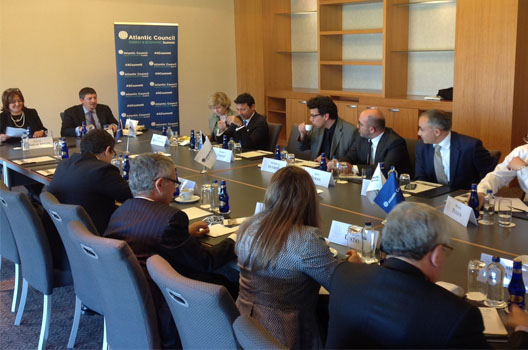While not much has changed for American investors, the Iran Nuclear Deal has brought about major shifts in international trade, particularity, but not exclusively, in the oil and gas sectors. Richard Nephew joined the Atlantic Council’s Turkey office on June 9, 2016, to discuss the obstacles facing Iran as the Islamic Republic reenters the global economy. “We should look at Iran as an emerging market with all of the challenges that come with an emerging market as well as the opportunities. We need to look at Iran as a place where, yes, you can do business but you have to be careful,” said Nephew.
At the private, high-level, roundtable moderated by Atlantic Council Turkey Representative Defne Sadiklar Arslan, Nephew, who is program director at the Center on Global Energy Policy at Columbia University, shared his perspective on the Iran nuclear deal, its background, and the future of Iran under the Joint Comprehensive Plan of Action (JCPOA). Richard Nephew is the former principal deputy coordinator for sanctions policy at the US State Department and also served as the lead sanctions expert in nuclear negotiations with Iran.
Nephew began the discussion by pointing out that the International Atomic Energy Agency (IAEA) has verified in three separate reports since January 2016 that Iran is fulfilling its obligations: it has dismantled part of its nuclear program, permanently modified one of its reactors, accepted new transparency, and brought its uranium and heavy water levels down to what is legally required under the deal. Nephew mentioned that there have been a few violations but that Iran, the P5+1, and the IAEA were able to resolve the issues quickly, peacefully and diplomatically.
Nephew pointed out that legally, in the wake of sanctions relief by the United States, European Union, and United Nations Security Council, Iran is able to restart all of the business that the sanctions sought to sever. However, he underlined three issues that have stopped Iran from realizing the full potential of sanctions relief.
1. Difficulty of operating in Iran: Nephew argued that businesses and banks are hesitant to return to Iran in part due to the bureaucratic and regulatory structures of the country and the uncertainty concerning who will wield the economic power of the country in the future. Nephew highlighted that despite Rouhani’s desire to renew Iran’s foreign policy and bring in new investment, particularly in oil and gas, when he came into office in 2013, Iran still does not have a new petroleum contract or a new model that oil and gas companies could use to invest in Iran. Nephew expressed doubt in actualization of a new petroleum contract, “we are being told that a new [iran petroleum] contract may be coming out in June or July, and I do not have any confidence that that will in fact be the case.”
2. The presence of residual sanctions has made companies and banks reluctant to return. Residual sanctions include potential prohibitions on banks holding corresponding banking accounts in the United States, and even the potential of having their assets, and the assets of companies, frozen if they do business with people in Iran who are identified as supporters of terrorism, violators of human rights, or instigators of regional instability. Nephew pointed out that Iran knew about these residual sanctions, that the US would never open its economy to Iran and, that the United States would not allow access to the US dollar as a regular medium of exchange. However, Iran did not comprehend how international banks and companies would perceive Iran after the deal was implemented.
3. The third major obstacle is the price of oil and international market conditions. Nephew noted that while oil was at one hundred dollars per barrel when the negotiations started, it had fallen to forty dollars per barrel by the time negotiations concluded. Taking into account that production in Iran is around twenty-five dollars per barrel, companies are not able to make the kinds of profits they had expected. Consequently, Nephew argued, Iran has had difficulty convincing companies that the risks are equal to the rewards, much less that the rewards exceed the risk.
Looking at the future of the deal, Nephew said that it would depend on both sides realizing what they has sought when negotiations started: nuclear compliance for the United States and its partners, and economic resurgence for Iran. He suggested that, assuming both Iran and the United States continue to comply with their terms of the deal, Iran’s economic recovery will continue. In addition to the oil and gas sector, Rouhani would also like to attract investment in industrial sectors in order to diversify the economy. However, according to Nephew, the real question is whether or not there will continue to be political space for Rouhani and his technocrats to have enough time to make this plan work.
Nephew underlined that companies can overcome the uncertainties of the deal by being careful, doing due diligence, and drafting contracts which include provisions regarding the possible reinstatement of sanctions and require the use of the dispute resolution mechanisms built into the deal.
Nephew concluded that even though the deal signifies a fundamental change covering almost all sectors of the economy in Iran, nothing changed for Americans regarding doing business with Iran. He added that the United States will not go back to Iran in the foreseeable future unless Iran were to stop supporting Hezbollah, stop violating its own population’s human rights, and stop engaging in the destabilizing activities they pursue in in the region.
